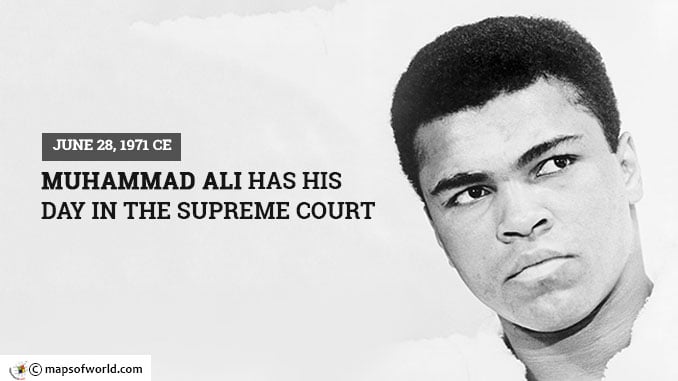There a handful of people from the 20th century who could be said to have exemplified excellence that transcended their chosen discipline and Muhammad Ali is arguably one of them. Having refused to serve in the United States Armed Forces during the Vietnam Conflict in 1967, the famous boxer produced another famous victory on June 28, 1971: the Supreme Court overturned his conviction for rejecting his appointment according to the draft. The process began in 1964, when Ali failed the qualifying test for the armed forces due to his poor spelling and writing abilities. That same year, after reportedly sneaking into rallies for the Nation of Islam, he became a Muslim and rejected his birth name Cassius Clay in favor of Muhammad Ali. Two years later, the US Armed Forces revised the testing procedures and Ali’s scores came under scrutiny again. With the new guidelines in place, he would be eligible for induction into the US Army for service in Vietnam. Citing the teachings of the Koran, Ali declared himself a conscientious objector, adding: “I ain’t got no quarrel with them Viet Cong…They never called me nigger.” He would, however, be forced to go to Houston and enter service on April 28, 1967. Choosing not to answer three separate times when his name was called, despite being made aware of the five-year prison sentence and $10,000 fine that came with his actions, Ali was arrested. From a professional standpoint, Ali would suffer as well. The New York State Athletic Commission revoked his license and took his title, forbidding him from boxing for three years – a penalty other states would quickly copy. Less than two months later, on June 20, a District Court jury convicted Ali of rejecting the orders of the US Government. Ali remained obstinate, even as a Court of Appeals upheld the ruling. Unable to box, he traveled the country speaking to student groups about his beliefs. His opinions, always controversial, typically played up the racial dominance of whites in the US: “Why should they ask me to put on a uniform and go ten thousand miles from home and drop bombs and bullets on brown people in Vietnam while so-called Negro people in Louisville are treated like dogs and denied simple human rights?” During the second half of 1970, while his case waited on the Supreme Court docket, Ali would return to the ring. He defeated Jerry Quarry and Oscar Bonavena to set up “The Fight of the Century” against champion Joe Frazier on March 8, 1971 – a highly-anticipated title fight which would end up being Ali’s first professional loss. (Some, citing Ali’s conviction and previous appeal, called it a victory for American values.) Arguments for Clay v. United States would be heard in front of the Supreme Court a month and a half later. Justice Thurgood Marshall, the nation’s first African American on the Court, recused himself, as he had been the chief attorney for the US when the case started. After the initial hearing on April 19, the remaining eight justices initially voted 5-3 for the decision to be upheld. Justice John Harlan, tasked with composing the majority opinion, found himself conflicted after learning more about Black Muslim beliefs – he felt Ali genuinely argued his conscience in refusing to serve. Now a 4-4 tie, the justices pored over the case to prevent Ali going to jail for draft evasion, as he would never have known why the decision resulted in jail time. (Opinions are not published when the justices come to a neutral result.) Justice Potter Stewart identified a technicality in the Department of Justice’s prosecution of the initial case, proposing a compromise which resulted in a unanimous 8-0 ruling. Ali, now free to continue boxing without the possibility of going to prison, would reclaim the world heavyweight title from George Foreman during “The Rumble in the Jungle” in 1974.
June 28, 1971 CE – Muhammad Ali Has His Day in the Supreme Court
There a handful of people from the 20th century who could be said to have exemplified excellence that transcended their chosen discipline and Muhammad Ali is arguably one of them.…
